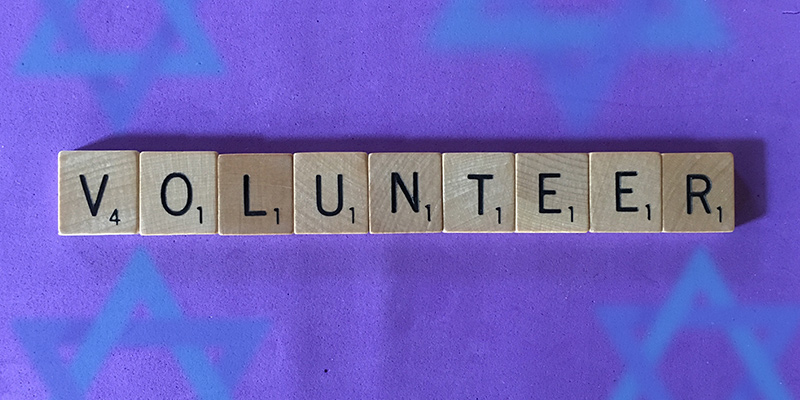
The International Volunteer Day is held on December 5th to recognize and celebrate the work and efforts of volunteers around the world. As the Swords of Iron War continues, new studies conducted by the Institute for the Study of Civil Society and Philanthropy in Israel at the Hebrew University uncover shifting patterns in volunteering in Israel, marking a notable departure from past trends. These surveys, carried out in collaboration with the Israeli Volunteering Council and the Ministry of Welfare and Social Services, shed light on the dynamic nature of volunteering amidst the ongoing conflict with Hamas.
Key findings from the surveys conducted at different intervals during the war highlight several significant shifts in the landscape of volunteering:
High rates/scope of volunteering: Almost every second Israeli citizen volunteered during the war (45% reported volunteering, 49% among the Jewish population and 28% among the Arab population). This is a higher rate than previous crises, for example during the Covid-19 pandemic 20.3% of the Israeli population reported volunteering.
Changing Volunteer Profiles: A noteworthy proportion of volunteers (25%) are identified as “spontaneous volunteers,” previously unengaged individuals who have stepped up during the conflict. This surge in participation marks a departure from routine volunteering trends, with only 20% having a history of regular volunteering.
Sociodemographic Shifts: The majority of volunteers are from secular backgrounds (49%), surpassing traditional and religious segments. Prior to the war volunteering rates among the religious and ultra-Orthodox population were higher than volunteering among the secular population. Additionally, a significant number reported above-average incomes, reflecting diverse economic backgrounds among volunteers.
Diverse Age Participation: Unlike previous patterns observed during the COVID-19 pandemic, volunteering during this conflict spans across age groups, with notable engagement from older demographics (43% aged 18–35, 52% aged 35–55, and 47% aged over 55).
Evolving Volunteering Areas: Volunteers have engaged in both traditional and new realms of volunteering, such as aiding in agriculture, PR efforts on social media, assisting security forces, aiding farmers, and supporting vulnerable populations.
Synergy Between Volunteering and Donations: Volunteers have shown a trend of combining hands-on activities with financial (53% of the volunteers) and in-kind contributions (78% of the volunteers), fostering a more integrated approach to support causes associated with the war.
Preference for Local Engagement: A substantial percentage (69%) of volunteers have engaged in activities within their local communities, with hyphenated volunteering through various affiliations like schools, youth movements, and professional groups.\
Technological Integration: Social media platforms and digital organizing, including WhatsApp groups, have played a pivotal role in recruiting, training, and coordinating volunteers, showcasing a shift towards tech-centric volunteering methodologies.
Emergence of Civilian Initiatives: Over a thousand civilian initiatives have sprung up across Israel, demonstrating rapid organization and engagement from diverse societal segments, including Haredi and Arab populations.
Impact and Intention to Continue: Volunteers expressed high rates of satisfaction and relief through their engagements and expressed a strong intent to continue volunteering post-war.
Professor Michal Almog-Bar, Head of the Institute for the Study of Civil Society and Philanthropy at Hebrew University, emphasized the importance of ensuring proper training for volunteers, preventing exploitation, and effective coordination to maximize the impact of volunteering efforts. “During this tumultuous time, the surge in volunteering reflects a powerful testament to the resilience and unity of Israeli society. The emergence of diverse volunteering patterns underscores our ability to adapt and collaborate, highlighting the crucial role each individual plays in shaping a stronger, more cohesive community.”
Despite the significant surge in volunteering, several challenges have emerged, including the need for professional oversight, support for volunteers facing secondary traumatization, efficient coordination, and preventing volunteer burnout.
The Hebrew University of Jerusalem is Israel’s premier academic and research institution. With over 25,000 students from 90 countries, it is a hub for advancing scientific knowledge and holds a significant role in Israel’s civilian scientific research output, accounting for nearly 40% of it and has registered over 11,000 patents. The university’s faculty and alumni have earned eight Nobel Prizes and a Fields Medal, underscoring their contributions to ground-breaking discoveries. In the global arena, the Hebrew University ranks 86th according to the Shanghai Ranking. To learn more about the university’s academic programs, research initiatives, and achievements, visit the official website at http://new.huji.ac.il/en.